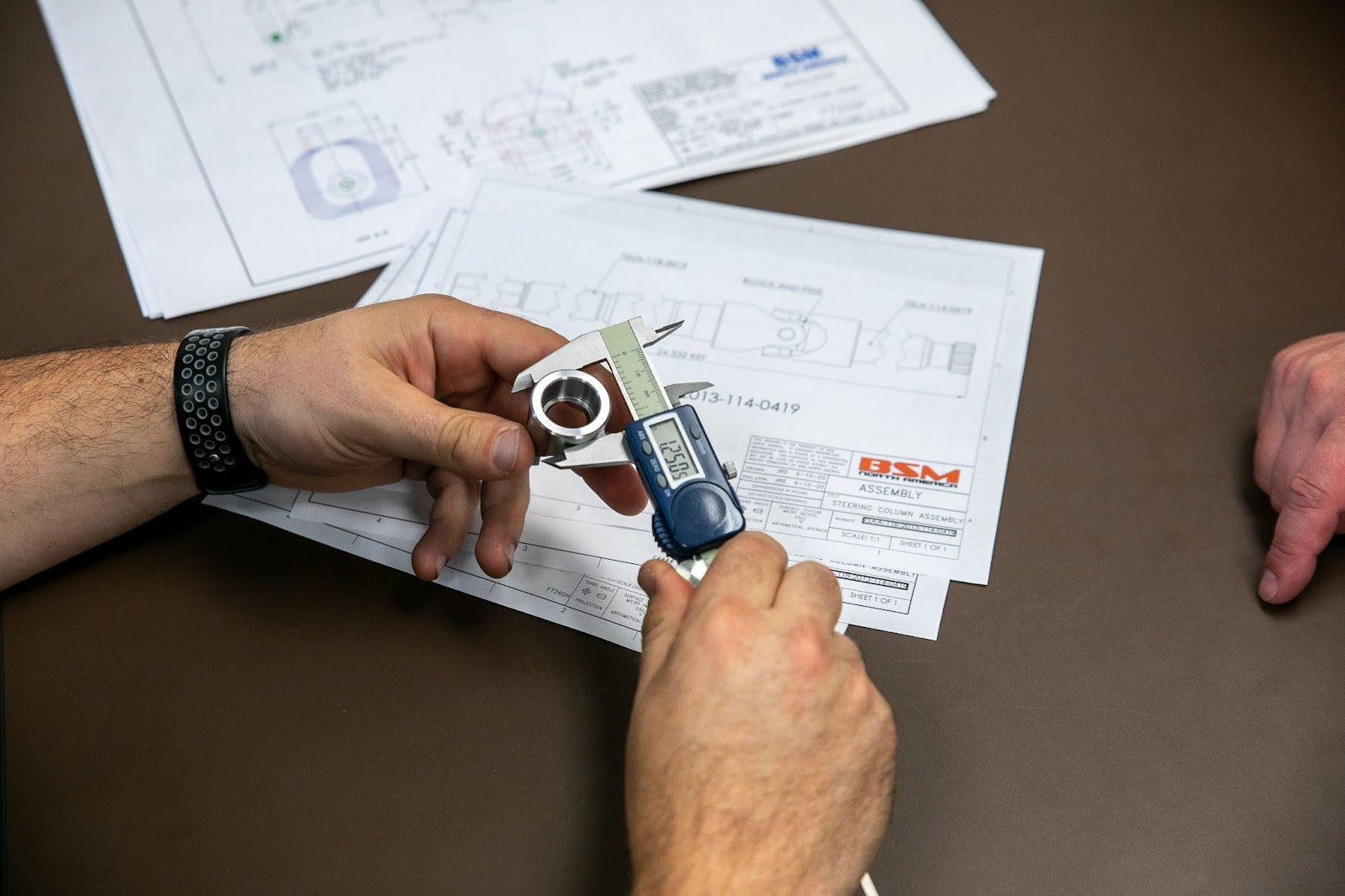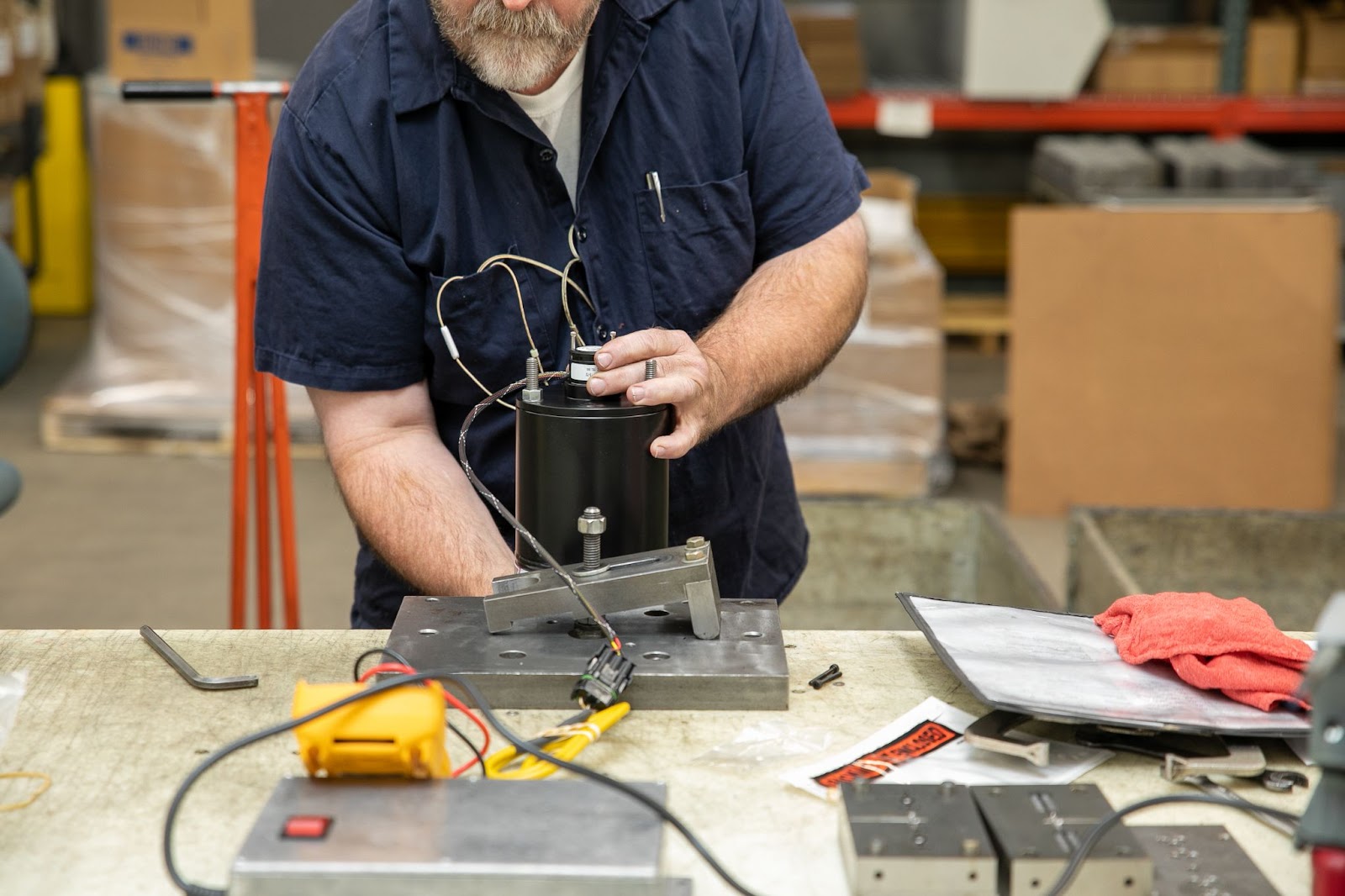A Guide to Steering Column Jargon
The steering column industry is a tricky one to understand, and that’s without adding on all the terminology the pros tend to throw around like common knowledge.
If you’re looking to have a custom steering column made, it adds a whole other layer of complexity, as you might feel you need to familiarize yourself with all of those multisyllable terms just to even communicate what you want.
You don’t need to learn industry jargon when you work with a customer-oriented company like BSM North America, because we strive to make our services as simple as possible. You’ll be walked through the entire process, asked questions, and have anything you don’t understand clarified.
That being said, it doesn’t hurt to familiarize yourself with a few common terms!
Here’s a comprehensive guide to frequently-used words that may pop up in discussion with your engineering and industrial fabrication teams.
Traditional Steering Column Components
Column: The whole steering column assembly
Console: Device that contains switches and controls for vehicle
FNR: Forward Neutral Reverse switch mounted below steering wheel for easy operation during driving
Rocker Switch: Style of switch common in vehicles to allow for auxiliary vehicle functions
Shifter: Type of switch that typically controls gear selection and speed mounted below the steering wheel
Self-Centering: Device that returns the steering wheel to center when the operator releases the wheel
Steering Wheel: Apparatus used to manipulate the direction of the vehicle
Spinner Knob: Additional steering wheel feature for added leverage or easier rotation
TSI: Turn Signal Indicator switch mounted below the steering wheel for easy operation during driving
Connection & Control Components
Collar: Additional structure for mounting larger diameter accessories
Bracket: Additional structure for added support or mounting accessories
Flange: Metal plate that mounts to floor or steering control motor
Inner Shaft: Rotating tube that transfers the movement of the steering wheel to steering control motor or gearbox
Lower End: Part of the shaft that connects to steering control motor or gearbox
Lower End Extension: Distance lower end sticks out below the flange, matched up with a specific steering control motor, and floor panel thickens
Outer Tube: Main structural tube to hold the steering shaft and connects to the vehicle
Serration: Ridges or teeth-type keys are formed on a shaft to mesh with grooves in a mating hub to transfer torque and rotational motion. Our most common version is 7/8" 36 tooth.
Upper End: Specifically machined shaft that matches to the steering wheel, many common variations
Measurements

Above Pivot Length: Length of the column in a tilt-type column measured from center axis of pivot to top of upper tube
Below Pivot Length: Length of the column in a tilt-type column measured from center axis of pivot to bottom flange
Bolt circle: Measurement of bolt pattern commonly referenced from SCU manufacturers
Jacket Length: Length of the straight column from bottom of flange to top of the outer tube
Major Diameter: The largest diameter to the tip of a serration’s teeth
Minor Diameter: The smallest diameter to the bottom of a serration’s teeth
Over Pin Diameter: Measurement of a serration over defined pins to determine tooth thickness
Tilt Angle: Measured angle between the center axis of shaft/tubes
Interior Functions & Connectors
Horn Brush (HBA): Special electrical connector which connects wires inside of the steering column from the inner shaft to the outer tube. Allows for conductivity with infinite and continuous rotation of the steering shaft.
Infinite Position: Tilting or telescoping device which can be repositioned at any location between a set angle or length
Involute Spline: Involute splines feature short and equally spaced teeth that allow for greater strength with more centered stress distribution. A special class 12 tooth involute spline is the most common interface to a steering control motor or orbital
Locking Gas Strut: Type of tilt mechanism that relies on a gas strut device to fix column at a specific angle
Mechanical Latch: Type of tilt mechanism that relies on a mechanical lock device to fix column at specific angles
Terminal: Specific connector used at end of wire to connect to different devices
Thread: A helical ridge on the outside of a screw, bolt, etc. or on the inside of a cylindrical hole, to allow two parts to be screwed together
Taper: A gradually narrowing section of the upper end at a specific slope to match with steering wheel
Wire: A thread of metal that is covered with plastic, rubber, etc., and used to send or receive electricity or electrical signals
Steering Components

E-steer: Method of linking steering components using electrical signals instead of hydraulic
Mechanical Stop: Device that integrates fixed rotational stops and a position sensor
Orbital: Same as steering control unit
Retaining Nut: Special nut used to connect the steering wheel to the column
Steer-By-Wire: Method of linking steering components using electrical signals instead of hydraulic
Steering Control Motor: Same as steering control unit
Steering Control Unit (SCU): Provides a fully fluid link between the pump and steering cylinder with no mechanical connection to control steering of vehicle
Tactical Feedback Device (TFD): Device used in e-steering or steer by wire that allows for variable resistance
Horn Components
Horn: Function of vehicle to create warning noise, typically located in the center of the steering wheel
Horn Button: Special switch located in the center of the wheel to allow for the operation of vehicle horn
Single Horn Wire: Style of horn button wiring utilizing one wire through the shaft, and grounding of the column to the vehicle
Two Horn Wire: Style of horn button wiring utilizing two wires through the shaft
Column Types
Straight Column: Steering column which mounts to steering control motor and steering wheel, with single length and no tilt/telescoping functions
Tilt Column: Steering column which mounts to the steering control motor and steering wheel, with tilting angle adjustment
Telescoping Column: Steering column which mounts to the steering control motor and steering wheel, with telescoping length adjustment
Manufacturing Processes

CNC Machining: An automated process in which a cutting tool is used to remove small chips of material from the workpiece
Welding: Joining together (metal pieces or parts) by heating the surfaces to the point of melting using a blowtorch, electric arc, or other means
We understand how intimidating industry jargon can be, even when you’re not expected to memorize it. BSM North America is devoted to customer satisfaction, and we can’t accomplish that if we aren’t on the same page as you, the customer.
Our team works hard to practice thorough, clear, and consistent communication, which means you’ll always know what’s going on with your project – even if you don’t know all of its parts by name.
We make the process of ordering custom steering columns streamlined and simple!
It’s Straightforward: BSM North America Means Quality
Sure, we’re straightforward in our communication, but we’re also straightforward in our promise to bring you quality results. No matter the project, no matter the simplicity or complexity, we bring the same forward-looking spirit to the table and the same drive to make the perfect part each and every time.
We go to the complexities of making sure your product fits your needs in all its components. Because of our advanced team and cutting-edge CNC machinery, we can devote ourselves to that while at the same time maintaining the speed and efficiency needed to meet the tightest deadlines.
Jargon or no jargon, your experience with us will be nothing but quality. That’s as plain as it gets.
Contact Us Today for All Your Steering Column Needs
Our Burnsville location is ready to take your ideas and make them into reality. Give us a call today at 952-890-8146.
8023